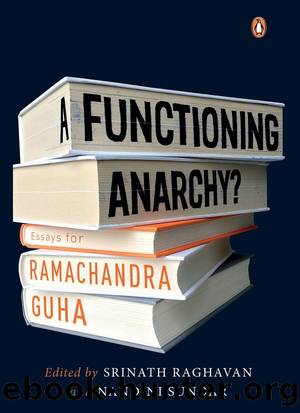A Functioning Anarchy by Ramachandra Guha

Author:Ramachandra Guha
Language: eng
Format: epub
ISBN: 9789390914104
Publisher: Penguin Group
Published: 2021-04-07T00:00:00+00:00
THE ICCF INCIDENT
While the Hindi literary world was still grappling with Agyeyaâs so-called collaborationist act of joining the British Army, he distanced himself from the debates. He had met Jayaprakash (JP) Narayan after the latterâs Hazaribagh jailbreak and the two hit it off instantly. In the 1940s, JP was already disenchanted with the Congress, but Agyeya joined an editorial boardâthat also had Rajendra Prasad, S. Radhakrishnan, K.M. Munshi, Seth Govind Das, Vishwanath More, Nandalal Bose, Lanka Sundaram and Purshottam Das Tandonâthat was planning a commemorative volume to celebrate Nehruâs sixtieth birthday. Being the youngest member, Agyeya was doing the bulk of the work. Reluctant to praise Nehru in print and probably trying to wriggle out, M.N. Roy demanded remuneration for his article. Agyeya promised to take up this demand with the editorial board, and suggested Roy should write on New Humanism. In any case, Agyeya had very little hope from the book, not only because it was heavily priced but also because there was âconsiderable general disillusionment and perplexityâ in society.76
Soon, however, Agyeya became part of something Nehru abhorred. The anti-fascist, anti-communist movement had taken a new turn in the 1950s with the emergence of the CIA-funded CCF. Agyeya and many acolytes of M.N. RoyâAbu Sayed (editor of Quest), K.K. Sinha, A.B. Shah, J.B.H. Wadia, Nissim Ezekiel, Philip Sprattâbecame part of it and so did JP, Ashok Mehta, Minoo Masani and others. CCF was funding Freedom First and Quest. Agyeya was the first secretary of the Indian CCF (ICCF) and also the literary editor of Thought magazine from Delhi.
The Nehru government did not take kindly to the formation of the Indian chapter of CCF. It was suspicious of its intentions and felt the forum would attack the governmentâs neutral foreign policy. It was with great reluctance that the Nehru government gave permission to the CCF to hold its second international conference in Delhi in 1951. However, with just a week left for the conference, permission was withdrawn. One of the reasons given was that it was less a meeting of CCF and more of an American Congress, forcing Agyeya and others to shift the venue to Bombay where Minoo Masaniâs Democratic Research Service took over the task of organizing the event. Celebrated international writers, scientists and poets like Stephen Spender, W.H. Auden, Denis de Rougemont and H.J. Muller attended the meeting. Nehruâs bête noire K.M. Munshi, a member of the cabinet, was also present and made the inaugural speech.77
For Agyeya, the conference became a huge personal embarrassment. Neither he nor his authorized biographer mentioned this incident in their writings. However, the James Burnham Papers in Stanfordâs Hoover Institution have all the details. A bank draft of $1000 sent by James Burnham, the CIAâs pointsman for CCF, went missing. Burnham thought that Agyeya, as secretary of ICCF, had diverted the funds to the bank account of Thought magazine. On close scrutiny of the magazineâs accounts, it turned out that he had indeed diverted the funds. Masani called him a thief and suspended him from ICCF.
Download
This site does not store any files on its server. We only index and link to content provided by other sites. Please contact the content providers to delete copyright contents if any and email us, we'll remove relevant links or contents immediately.
| Africa | Americas |
| Arctic & Antarctica | Asia |
| Australia & Oceania | Europe |
| Middle East | Russia |
| United States | World |
| Ancient Civilizations | Military |
| Historical Study & Educational Resources |
Magic and Divination in Early Islam by Emilie Savage-Smith;(1194)
Ambition and Desire: The Dangerous Life of Josephine Bonaparte by Kate Williams(1084)
Operation Vengeance: The Astonishing Aerial Ambush That Changed World War II by Dan Hampton(985)
What Really Happened: The Death of Hitler by Robert J. Hutchinson(868)
London in the Twentieth Century by Jerry White(845)
Time of the Magicians by Wolfram Eilenberger(842)
Twilight of the Gods by Ian W. Toll(811)
The Japanese by Christopher Harding(796)
Papillon by Henry Charrière(793)
Lenin: A Biography by Robert Service(779)
The Devil You Know by Charles M. Blow(777)
Twelve Caesars by Mary Beard(764)
Freemasons for Dummies by Hodapp Christopher;(747)
The Churchill Complex by Ian Buruma(729)
Napolean Hill Collection by Napoleon Hill(701)
The Enlightenment by Ritchie Robertson(690)
Henry III by David Carpenter;(685)
Bohemians, Bootleggers, Flappers, and Swells: The Best of Early Vanity Fair by Bohemians Bootleggers Flappers & Swells- The Best of Early Vanity Fair (epub)(681)
The Rise and Triumph of the Modern Self by Unknown(654)
